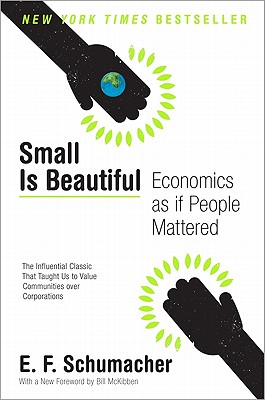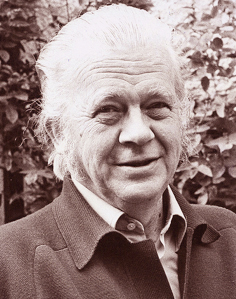 |
Home |
Catalogs |
Contact Us |

Books on:
Animal RightsBlack History
Clean Energy
Democracy
Eco Design
Eco History
Food and Nutrition
Genetic Engineering
Green Cities
Green Politics
Local Economics
Natural Building
Peace and Nonviolence
Simple Living
Trees and Forests
 |
Small is Beautiful
Economics as if People Mattered
by E. F. Schumacher
Harper Perenniel, 2010, introduction by Theodore Roszak, forward by Bill McKibben
Purchase
on Amazon.com
One of the fundamental books on ecological economics. Written in a charming and simple style, Schumacher asks us to look behind the basic assumptions of modern economics.
Praise for Small is Beautiful
"I had never heard of E. F. Schumacher before reading this book. After reading it I am ready to nominate him for the Nobel Prize in economics. . . . His book is a most unusual economic treatise, enormously broad in scope, pithily weaving together threads from Galbraith and Gandhi, capitalism and Buddhism, science and psychology." --The New Republic
"For those to whom economics means a book filled with numbers, charts, graphs, and formulae, together with much heady discussion of abstract technicalities like the balance of payments and gross national product, this remarkable collection of essays is certain to come either as a shock or a relief. E. F. Schumacher's economics is not part of the dominant style. On the contrary, his deliberate intention is to subvert 'economic science' by calling its every assumption into question, right down to its psychological and metaphysical foundations." -- From the introduction by Theodore Roszak.
"Schumacher's work belongs to that subterranean tradition of organic and decentralist economics whose major spokesmen include Prince Kropotkin, Gustave Landauer, Tolstoy, William, Morris, Gandhi, Lewis Mumford, and most recently, Alex Comfort, Paul Goodman, and Murray Bookchin. It is the tradition we might call anarchism, if we mean by that much abused word a libertarian political economy that distinguishes itself from orthodox socialism and capitalism by insisting that the scale of organization must be treated as an independent and primary problem. The tradition, while closely affiliated with socialist values, nonetheless prefers mixed to 'pure' economics systems. It is therefore hospitable to many forms of free enterprise and private ownership, provided always that the size of private enterprise is not so large as to divorce ownership from personal involvement, which is, of course, now the rule in most of the world's administered capitalisms." -- From the introduction by Theodore Roszak.
Quotes from Small is Beautiful
"[A modern economist] is used to measuring the 'standard of living' by the amount of annual consumption, assuming all the time that a man who consumes more is 'better off' that a man who consumes less. A Buddhist economist would consider this approach excessively irrational: since consumption is merely a means to human well-being, the aim should be to obtain the maximum of well-being with the minimum of consumption. . . . The less toil there is, the more time and strength is left for artistic creativity. Modern economics, on the other hand, considers consumption to be the sole end and purpose of all economic activity."
"It is clear, therefore, that Buddhist economics must be very different from the economics of modern materialism, since the Buddhist sees the essence of civilisation not in a multiplication of wants but in the purification of human character. Character, at the same time, is formed primarily by a man's work. And work, properly conducted in conditions of human dignity and freedom, blesses those who do it and equally their products."
"The most striking about modern industry is that it requires so much and accomplishes so little. Modern industry seems to be inefficient to a degree that surpasses one's ordinary powers of imagination. Its inefficiency therefore remains unnoticed."
"Ever bigger machines, entailing ever bigger concentrations of economic power and exerting ever greater violence against the environment, do not represent progress: they are a denial of wisdom. Wisdom demands a new orientation of science and technology towards the organic, the gentle, the non-violent, the elegant and beautiful."
"[N]o system or machinery or economic doctrine or theory stands on its own feet: it is invariably built on a metaphysical foundation, that is to say, upon man's basic outlook on life, its meaning and its purpose. I have talked about the religion of economics, the idol worship of material possessions, of consumption and the so-called standard of living, and the fateful propensity that rejoices in the fact that 'what were luxuries to our fathers have become necessities for us.'
"Systems are never more no less than incarnations of man's most basic attitudes. . . . General evidence of material progress would suggest that the modern private enterprise system is--or has been--the most perfect instrument for the pursuit of personal enrichment. The modern private enterprise system ingeniously employs the human urges of greed and envy as its motive power, but manages to overcome the most blatant deficiencies of laissez-faire by means of Keynesian economic management, a bit of redistributive taxation, and the 'countervailing power' of the trade unions.
"Can such a system conceivably deal with the problems we are now having to face? The answer is self-evident: greed and envy demand continuous and limitless economic growth of a material kind, without proper regard for conservation, and this type of growth cannot possibly fit into a finite environment. We must therefore study the essential nature of the private enterprise system and the possibilities of evolving an alternative system which might fit the new situation."
Table of Contents of Small is Beautiful
PART I - THE MODERN WORLD
- The Problem of Production
- Peace and Permanence
- The Role of Economics
- Buddhist Economics
- A Question of Size
PART II - RESOURCES
- The Greatest Resource--Education
- The Proper Use of Land
- Resources for Industry
- Nuclear Energy--Salvation or Damnation?
- Technology with a Human Face
PART III - THE THIRD WORLD
- Development
- Social and Economic Problems Calling for the Development of Intermediate Technology
- Two Million Villages
- The Problem of Unemployment in India
PART IV - ORGANISATION AND OWNERSHIP
- A Machine to Foretell the Future?
- Towards a Theory of Large-Scale Organisation
- Socialism
- Ownership
- New Patterns of Ownership
Reader Comments |
